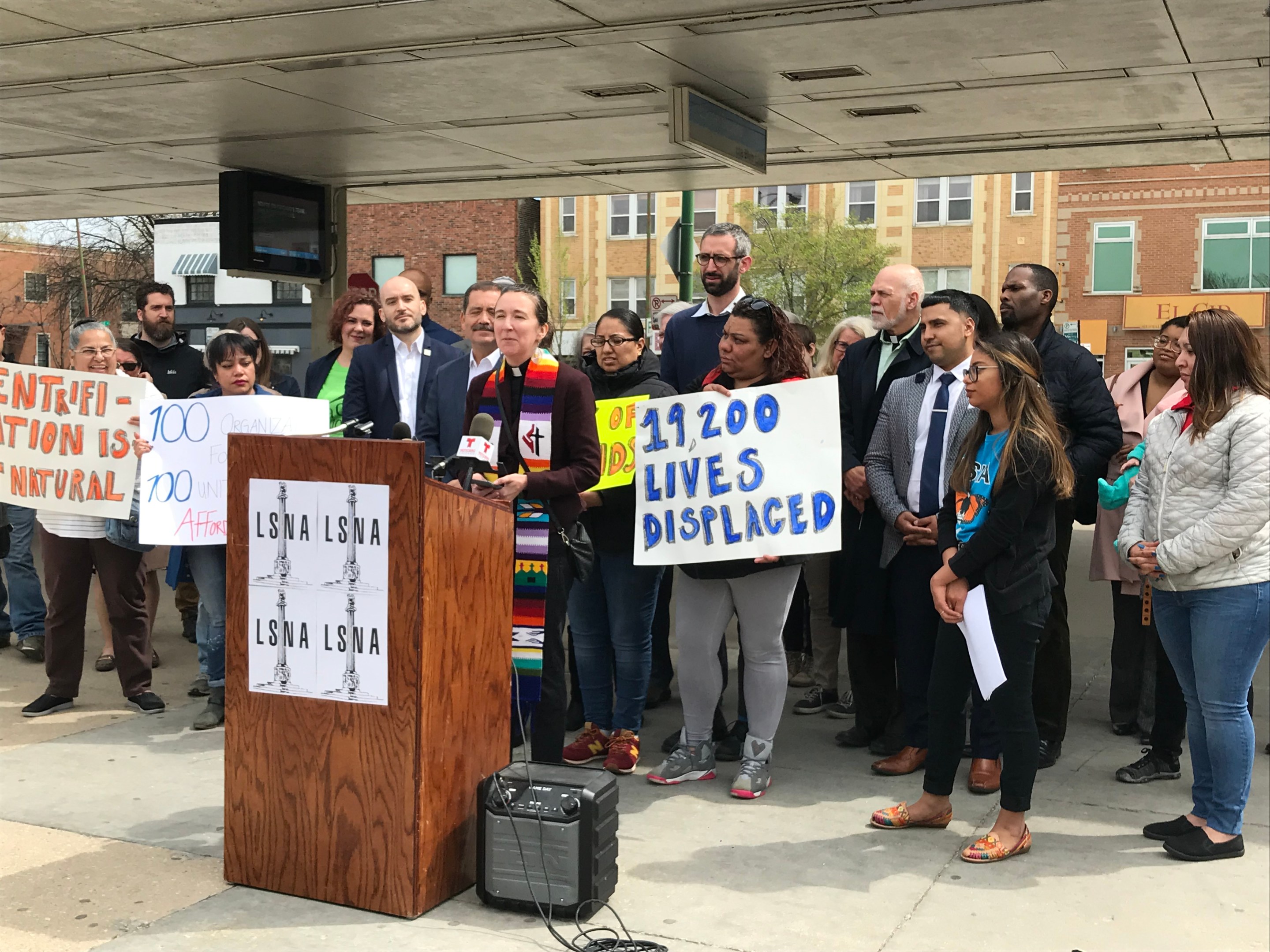On the morning before tonight's community input meeting for the proposed 100-unit, 100-percent affordable transit-oriented development for the Emmett Street parking lot next to the Logan Square Blue Line station, advocates held a press conference to call attention to the over 100 organizations supporting the project. The hearing takes place this evening at 6:30 p.m. at Logandale Middle School, 3212 West George Street.
Niketa Brar, executive director of Chicago United for Equity, talked about being invited by the the Logan Square Neighborhood Association and LUCHA to work with community members to develop a racial equity impact assessment of the city's plans to redesign the nearby Logan traffic circle in 2018.
CUE’s racial equity assessment fellows interviewed community members, reviewed data, and brought people together to explore possibilities for the project. The fellows found that there is a potential for the initiative, which will make the circle more walkable and add more open space, to raise property values and housing costs, and therefore accelerate the ongoing displacement of longtime residents. The Emmett Street development would help mitigate those impacts, while improving transit access for low-income and working class residents and allowing them to stay in the neighborhood to benefit from the circle redesign.
“Chicago United for Equity is proud to support the outcome of this community-based process and to endorse Emmett Street’s affordable housing development," Brar said. “I want to also highlight and point out that this is the first time in Chicago’s history that a racial equity impact assessment has been used to evaluate an infrastructure project.”
Congressman Jesus “Chuy” Garcia also lauded the Emmett Street project as an example for others to follow. “This is what equitable development can be about,” Garcia said. “You are showing neighborhoods from Logan Square to Little Village and Brighton Park and throughout the South and the West sides of Chicago that our communities should be able to live in Chicago, that they should be able to [travel] to work, to school, to visit cultural institutions, to visit relatives on public, affordable transportation. “
Jim Merrell, advocacy director of the Active Transportation Alliance, said that building affordable housing near transit aligns with his group's core values. “If people are forced to own a car in order to navigate their lives, our mission is not being served,” he said. Merrell added that housing and transportation make up the largest portion of most household budgets and that owning a car costs on average $8,000 a year.
“When affordable housing is placed together with public transit, it gives working families more opportunities than transit or housing alone can provide," Merrell said. "This is how projects like Emmett Street create more equitable communities.” He noted that the Blue Line connects to job centers like the Loop and the Illinois Medical District. “These benefits should not be the sole possession of the affluent, but rather be prioritized for those who need it most.”
Daniel De Los Reyes, principal of Darwin Elementary, noted that enrollment in the neighborhood schools is declining as more families are priced out of the area. “When you are having to fight for students who are bound to great high schools, who [make the] honor roll and have great attendance, and you are fighting for them to remain in their schools because they cannot afford to live in the community in which they grew up, then we are having a housing crisis.”
“This is a once in a lifetime opportunity to correct history,” Reyes said. “[With] proposals like the Emmett Street proposal, we can begin to revitalize our neighborhood schools like Monroe, like Logandale, like Darwin.”
Reverend Paula Cripps-Vallejo of the Logan Square Ecumenical Alliance praised the development and encouraged neighbors not to fall into patterns of demonizing affordable housing. “There are neighbors that have been... using fear and racism to stir the community up but we are going to stand here and continue to say we need 100-percent affordable housing at Emmett Street, that we need these 100 units, that this has to happen because that is what our community needs."
State Representative Will Guzzardi stressed the importance of using public assets for the public good and said Emmett Street can serve as an example of this. “I think it hasn’t been said enough today that the units that are going to be built here, the 100 affordable units, aren’t studio apartments, these are two- and three-bedroom units for families.”
Guzzardi added that the community has a unique opportunity to reimagine what it can do with the public land they have. “I think that’s the opportunity that we have with the public land here today, not to turn it over to a developer to build luxury high-rise apartments, but to build a project that will bring everyone in our community here and will create a home for the people in our community who are struggling to find it. “




